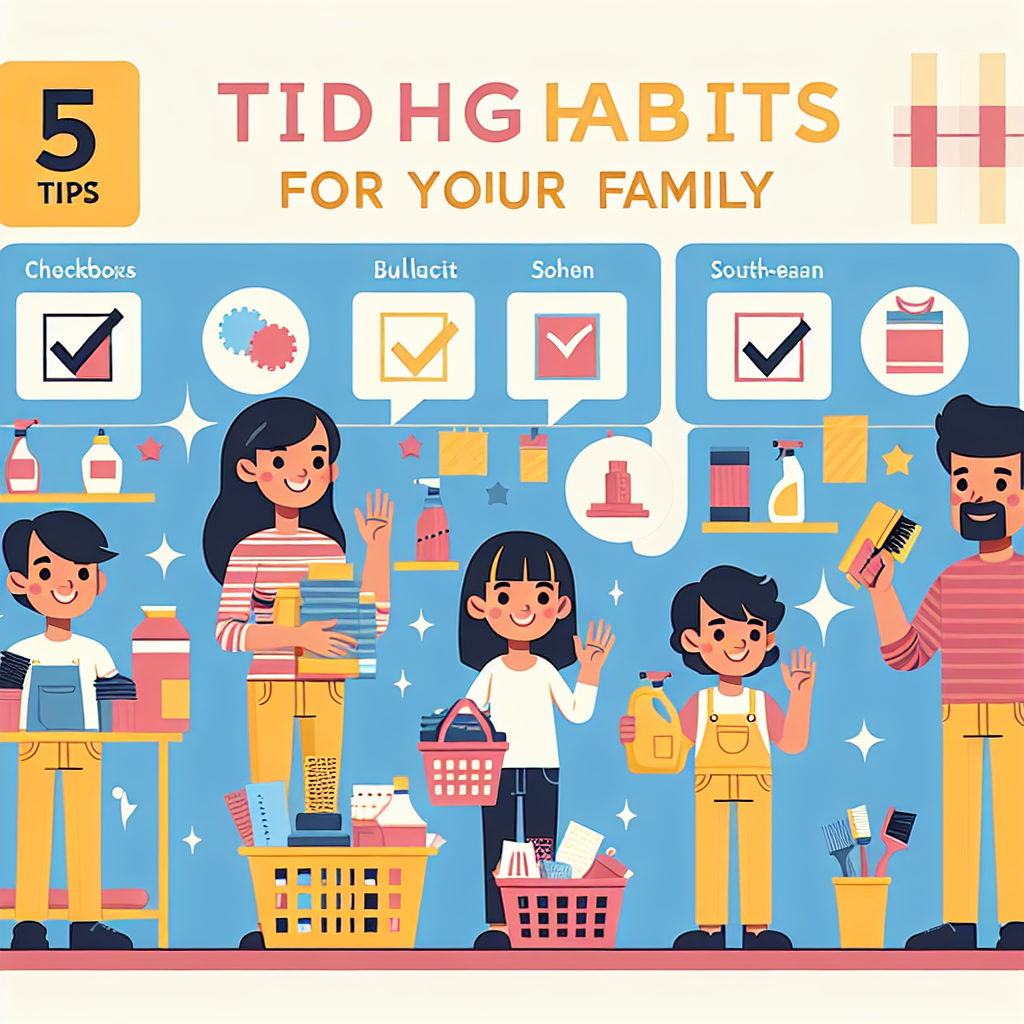Panduan praktis untuk membantu keluarga membangun kebiasaan rapi dalam lima langkah sederhana.
5 Trik Membangun Kebiasaan Rapi untuk Keluarga
-
Table of Contents
- Introduction
- Communicate the Importance of Cleanliness
- Define Responsibilities
- Lead by Example
- Morning Routine
- Evening Routine
- Weekly Cleaning Schedule
- Declutter Regularly
- Designate Storage Areas
- Labeling and Categorizing
- Turn Cleaning into a Game
- Reward System
- Hold Family Meetings
- Lead Continuous Learning
- Summary
Introduction

Building good habits is essential for a well-organized and harmonious family life. When everyone in the family follows a routine and maintains cleanliness and orderliness, it creates a positive environment that promotes productivity and happiness. In this article, we will explore five tricks to develop neat habits for your family.
1. Set Clear Expectations
Communicate the Importance of Cleanliness
To establish a habit of tidiness within your family, it is crucial to communicate the importance of cleanliness. Explain to your family members how cleanliness can contribute to their overall well-being and create a pleasant living environment. Encourage them to take pride in their surroundings and emphasize the benefits of an organized space.
Define Responsibilities
Assigning specific responsibilities to each family member is an effective way to ensure that everyone contributes to maintaining cleanliness. Create a chore chart that clearly outlines each person’s tasks and rotate them regularly to avoid monotony. By involving everyone in the cleaning process, you instill a sense of ownership and accountability.
Lead by Example
Children often learn by observing their parents’ behavior. Therefore, it is essential for parents to lead by example and demonstrate neat habits themselves. Make sure you consistently follow the rules and expectations you have set for your family. When children see their parents practicing cleanliness, they are more likely to adopt the same habits.
2. Establish Daily Routines
Morning Routine
Start the day off right by establishing a morning routine that includes tidying up personal spaces. Encourage family members to make their beds, put away clothes, and organize their belongings before leaving their rooms. This simple habit sets a positive tone for the day and ensures that everyone starts with a clean slate.
Evening Routine
An evening routine is equally important in maintaining a tidy household. Allocate a specific time for everyone to tidy up common areas before bedtime. This could involve clearing the dining table, washing dishes, and putting away toys or other items. By making this a collective effort, you teach your family the importance of teamwork and shared responsibility.
Weekly Cleaning Schedule
In addition to daily routines, establish a weekly cleaning schedule to tackle more extensive tasks. Assign specific days for tasks such as vacuuming, dusting, and deep cleaning different areas of the house. By breaking down these tasks into manageable chunks, you avoid overwhelming your family members and ensure that the entire house remains clean and organized.
3. Create Organized Spaces
Declutter Regularly
Clutter can quickly accumulate and make it challenging to maintain a neat environment. Encourage your family members to declutter regularly by getting rid of items they no longer need or use. Teach them the importance of letting go of unnecessary possessions and creating space for things that truly matter.
Designate Storage Areas
To maintain an organized home, it is crucial to designate specific storage areas for different items. Teach your family members to return items to their designated places after use. This habit not only keeps the house tidy but also saves time and reduces the chances of misplacing important belongings.
Labeling and Categorizing
Labeling and categorizing items can significantly contribute to maintaining orderliness. Use labels or color-coded systems to identify different categories of items, such as books, toys, or kitchen supplies. This practice makes it easier for everyone to find what they need and ensures that items are returned to their proper places.
4. Make Cleaning Fun
Turn Cleaning into a Game
Cleaning doesn’t have to be a tedious chore. Turn it into a fun activity by creating games or challenges for your family members. For example, set a timer and see who can clean up their room the fastest or play upbeat music while doing household chores. By making cleaning enjoyable, you encourage active participation and create a positive association with cleanliness.
Reward System
Implement a reward system to motivate your family members to maintain neat habits. Set achievable goals and reward them with small incentives or privileges when they consistently follow the established routines and keep their spaces tidy. This positive reinforcement encourages everyone to take responsibility for their actions and fosters a sense of accomplishment.
5. Regularly Review and Adjust
Hold Family Meetings
Regularly schedule family meetings to discuss the progress of your neatness habits. Encourage open communication and allow each family member to share their thoughts and suggestions. Use this time to address any challenges or concerns and make necessary adjustments to the routines or responsibilities.
Lead Continuous Learning
Promote continuous learning by providing resources and information on organizing techniques and cleanliness tips. Encourage your family members to read books or articles on the subject and share their newfound knowledge with each other. By fostering a culture of learning, you empower your family to continuously improve their habits and maintain a neat environment.
Summary
Developing neat habits within your family requires clear expectations, daily routines, organized spaces, fun approaches to cleaning, and regular review and adjustment. By setting clear expectations, establishing daily routines, creating organized spaces, making cleaning fun, and regularly reviewing and adjusting, you can build a habit of cleanliness that will benefit your family’s overall well-being and create a harmonious living environment. Remember, consistency and leading by example are key to successfully instilling these habits in your family members.







